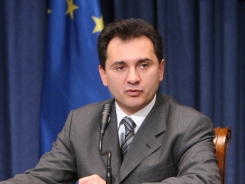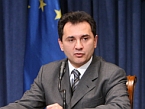Q:
A:
Political agreement with EU to be signed on February 7
Belgrade,
2 February 2008
Serbian Deputy Prime Minister Bozidar Djelic said today that he believes that the political agreement with the EU will be signed on February 7, which is historical as all EU members and the European Commission guarantee with it Serbia's membership in the Union and the abolishment of visas for Serbian citizens.
In an interview for today's edition of Vecernje Novosti daily, Djelic anticipates that the government will be united regarding the signing of this agreement and added that three-fourths of the population in Serbia expect the government to provide a fast track entrance to the EU.
The government will consider the text of the political agreement, and I expect it will be presented to us early next week, he announced and noted that surprises are rare with Europe.
As head of the Serbian negotiating team with the EU, I have witnessed that we attempted to introduce two provisions in the Stabilisation and Association Agreement (SAA), namely definite EU accession and visa abolishment – but we did not manage to do that. The political agreement offers that, which means that it is not above the level of SAA but a big step forward for Serbia, Djelic explained.
Asked what would happen if the EU decides to send its mission to Kosovo, he responded that great diplomatic efforts are being made so that it does not happen without a UN Security Council resolution, noting that those efforts are already yielding their first results.
The Deputy Prime Minister also anticipates that he will be authorised by the government to sign the political agreement with the EU.
Commenting on his previous announcements that the SAA would be signed with the EU but it did not happen, Djelic said that despite the huge effort of the 25 EU members that lobbied and defended Serbia, the Netherlands was adamant in its request for full cooperation with the Hague tribunal to be completed before the SAA could be signed.
Djelic said that EU Enlargement Commissioner Olli Rehn confirmed that there is progress in cooperation and expressed assurance that the Netherlands might soon give its consent to the signing of SAA.
Asked when Serbia will complete its cooperation with The Hague, Djelic said he hopes for the results as soon as possible.
He added that end of cooperation with the tribunal is the only condition for signing the SAA, and expressed hope this will happen soon.
Djelic also dismissed the possibility that the signing of the SAA would be a trade-off for Kosovo's independence.
Serbia will never barter with Kosovo-Metohija, nor will it accept its independence. Just as the energy agreement was not a concession to Russia over Kosovo, so we will not give the EU any concessions over the province for the sake of speedier EU integration. For us, and for the EU, these are two separate processes, Djelic concluded.
He also said that he changed his air ticket for Brussels on January 28 to February 7 and added that he will use his pen twice – to sign the political agreement and the SAA.
Djelic also noted that the political agreement will only speed up Serbia's EU integration.
France, which will hold the rotating EU presidency in the second half of 2008, said it will support Serbia’s bid for candidacy status in that period. That's why I think that Serbia could join the EU within three to five years, or before 2014 which I mentioned before as the final deadline, Djelic said.
Speaking about the dialogue with the European Commission on visa liberalisation, he said that the president of the European Commission promised that Serbian citizens will travel without visas to the EU starting from 2009. He also noted that Serbian Minister of Interior Dragan Jocic has a very important role in the process of visa abolishment.
Djelic said that he has not had time to sign up for free shares, but once he does he will present them to the Zoran Djindjic Fund.
Speaking about the first 204 new passports that will be given out to mark 204 years of Serbia's statehood, he said that an competition will be organised in cooperation with Vecernje Novosti and Radio Television Serbia so readers and viewers can vote for ordinary people who are renowned for their courage, sacrifice, knowledge, and humanity.
Djelic said that IDs need not be replaced this year but when they expire. He said that as of April 1 citizens will receive the highest quality and most modern passports in Europe with a validity period of ten years, or €2.5 per year.
Such passports are the main precondition for visa abolishment he said and noted that they will cost €37 in Montenegro, €36 in Slovenia and €33 in Macedonia.
The government will consider the text of the political agreement, and I expect it will be presented to us early next week, he announced and noted that surprises are rare with Europe.
As head of the Serbian negotiating team with the EU, I have witnessed that we attempted to introduce two provisions in the Stabilisation and Association Agreement (SAA), namely definite EU accession and visa abolishment – but we did not manage to do that. The political agreement offers that, which means that it is not above the level of SAA but a big step forward for Serbia, Djelic explained.
Asked what would happen if the EU decides to send its mission to Kosovo, he responded that great diplomatic efforts are being made so that it does not happen without a UN Security Council resolution, noting that those efforts are already yielding their first results.
The Deputy Prime Minister also anticipates that he will be authorised by the government to sign the political agreement with the EU.
Commenting on his previous announcements that the SAA would be signed with the EU but it did not happen, Djelic said that despite the huge effort of the 25 EU members that lobbied and defended Serbia, the Netherlands was adamant in its request for full cooperation with the Hague tribunal to be completed before the SAA could be signed.
Djelic said that EU Enlargement Commissioner Olli Rehn confirmed that there is progress in cooperation and expressed assurance that the Netherlands might soon give its consent to the signing of SAA.
Asked when Serbia will complete its cooperation with The Hague, Djelic said he hopes for the results as soon as possible.
He added that end of cooperation with the tribunal is the only condition for signing the SAA, and expressed hope this will happen soon.
Djelic also dismissed the possibility that the signing of the SAA would be a trade-off for Kosovo's independence.
Serbia will never barter with Kosovo-Metohija, nor will it accept its independence. Just as the energy agreement was not a concession to Russia over Kosovo, so we will not give the EU any concessions over the province for the sake of speedier EU integration. For us, and for the EU, these are two separate processes, Djelic concluded.
He also said that he changed his air ticket for Brussels on January 28 to February 7 and added that he will use his pen twice – to sign the political agreement and the SAA.
Djelic also noted that the political agreement will only speed up Serbia's EU integration.
France, which will hold the rotating EU presidency in the second half of 2008, said it will support Serbia’s bid for candidacy status in that period. That's why I think that Serbia could join the EU within three to five years, or before 2014 which I mentioned before as the final deadline, Djelic said.
Speaking about the dialogue with the European Commission on visa liberalisation, he said that the president of the European Commission promised that Serbian citizens will travel without visas to the EU starting from 2009. He also noted that Serbian Minister of Interior Dragan Jocic has a very important role in the process of visa abolishment.
Djelic said that he has not had time to sign up for free shares, but once he does he will present them to the Zoran Djindjic Fund.
Speaking about the first 204 new passports that will be given out to mark 204 years of Serbia's statehood, he said that an competition will be organised in cooperation with Vecernje Novosti and Radio Television Serbia so readers and viewers can vote for ordinary people who are renowned for their courage, sacrifice, knowledge, and humanity.
Djelic said that IDs need not be replaced this year but when they expire. He said that as of April 1 citizens will receive the highest quality and most modern passports in Europe with a validity period of ten years, or €2.5 per year.
Such passports are the main precondition for visa abolishment he said and noted that they will cost €37 in Montenegro, €36 in Slovenia and €33 in Macedonia.











